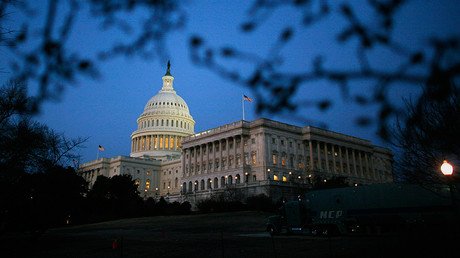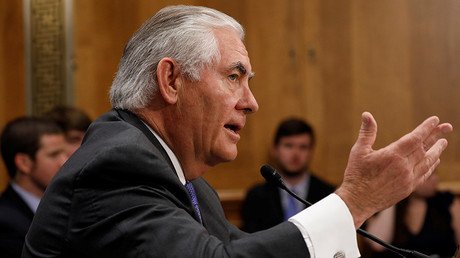Germany, Austria hit out at US over new anti-Russian sanctions
“Unacceptable” new anti-Russian sanctions approved by the US Senate violate international law, affect European companies and have a real aim of benefitting the US oil and gas sector, Berlin and Vienna said in an angry joint statement.
The new anti-Russian sanctions are outlined in an amendment to a bill imposing sanctions against Iran. It was approved by the US Senate on Thursday by a majority of 98 to 2, but still needs to pass the House of Representatives and be signed by the US president to become law.
The anti-Russian measures in the amendment involve imposing penalties on enterprises that cooperate with Russian oil and gas companies. A number of European companies are doing just that, participating for example in the Nord Stream 2 pipeline project.
“Europe's energy supply is a matter for Europe, and not the United States of America!” said the joint statement by German Foreign Minister Sigmar Gabriel and Austrian Chancellor Christian Kern, published on Thursday.
“We cannot accept threatening European companies that contribute to the development of the European energy supply [system] with extraterritorial sanctions that violate the international law.”
“Sanctions as a political instrument should not be linked to economic interests,” the statement says. It adds that “threatening German, Austrian and other European enterprises, which take part in the gas supply projects such as the Nord Stream II together with Russia or finance them, with penalties on the US market would add an absolutely new and highly negative aspect in relations between the US and Europe.”
The statement went on to say that Washington’s intention to impose new sanctions against Russia is guided not by some political or humanitarian reasons but rather by economic interest.
“This issue is all about the sales of the US condensed gas [to Europe] and pressing the Russian energy supply companies from the European market. The actual goal [of such sanctions] is to provide jobs for the US gas and oil industry,” the statement says, citing the US bill on the new sanctions.
Gabriel and Kern also expressed their concerns over the fact that the US is actually trying to boost its own competitiveness at the expense of its European allies that the new measures would eventually negatively affect “competitive positions of our [European] energy intensive industries and thousands of jobs.”
They also accused the US of attempts to interfere in Europe’s internal affairs and impose its will on its allies by undermining the principle of “open and fair market competition.”
“It would be not only highly regrettable but also detrimental to the effectiveness of our position in the context of the Ukrainian conflict, if some unrelated issues such the US economic interests in exporting gas gain the upper hand in this matter,” the statement warns.
The two politicians then urged the US authorities to back away from these plans and said that they “very much support” the efforts of the US Department of State aimed at changing the bill concerning the sanctions.
US State Department spokesperson Heather Nauert refused to comment on the criticism voiced by Austria and Germany that the bill’s real beneficiary is the US energy sector. Instead she said that Washington “welcomes” the first US shipment of the liquefied natural gas to Poland (LNG) that arrived in the Polish port of Swinoujscie last week.
She argued that such shipments provide an alternative to the Russian gas supplies as they come from the countries “that are perhaps more stable.”
“Russia has the ability to turn off the natural gas and it puts the Polish people in a very difficult situation,” Nauert said.
The amendment on anti-Russian sanctions stipulates “broad new sanctions on key sectors of Russia’s economy, including mining, metals, shipping and railways”. The bill also prohibits lifting any executive sanctions imposed on Russia by the Obama administration without congressional review.
The amendment states that the goal of US policy in this particular case is to “oppose the Nord Stream II pipeline given its detrimental impacts on the European Union's energy security… and energy reforms in Ukraine.”
According to the amendment, the US president can impose sanctions against entities and individuals that either make an investment “that directly and significantly contributes to the enhancement of the ability of the Russian Federation to construct energy export pipelines” or provides Russia with “goods, services, technology, information, or support that could directly and significantly facilitate the maintenance or expansion of the construction, modernization, or repair of [its] energy pipelines.”
The White House, meanwhile, said it is still looking at the Senate’s proposal to slap Russia with new sanctions, with deputy spokesman James S. Brady saying that the amendment first “needs to go through the House” for Trump to weigh in.
Brady, however, added that the US administration views the existing sanctions against Moscow “the best tool for compelling Russia” to comply with the Minsk agreements.
Russian President Vladimir Putin on Thursday said that Russia has been historically living under some form of sanctions from the West, which are used as a tool of economic competition as well as a means of containment.
“If there were no situation with Crimea and other problems, they would have invented something else to contain Russia,” he said.
US Secretary of State Rex Tillerson called for a more “flexible approach” to the issue of anti-Russian sanctions. He particularly said that he would not like to see Washington “handcuffed” to the progress in the implementation of the Minsk agreements as Moscow and Kiev could eventually find some other way to resolve the crisis in eastern Ukraine.
Earlier, Tillerson also said that virtually all US partners and allies were calling on Washington to improve its relations with Russia and warned that a new set of restrictive measures against Moscow might further worsen relations with Russia.
The Nord Stream II project will give Russia’s Gazprom additional capacity in supplying Europe with gas through a pipeline that would go under the Baltic Sea to Germany.
The project is operated by the Nord Stream II company, which is fully owned by Gazprom. However, half of the project’s cost, amounting to €9.5 billion, is financed by several European energy as well as oil and gas companies, including Shell, Uniper, Wintershall, Engie and OMV, which thus can be affected by the new US sanctions.
Some of these companies already suffered from the US Senate’s decision to approve the sanctions bill as the shares of the OMV fell 3.7 percent Thursday, while Engie was down 1.3 percent, Shell 1.1 percent and Uniper 0.9 percent, according to the Financial Times.















